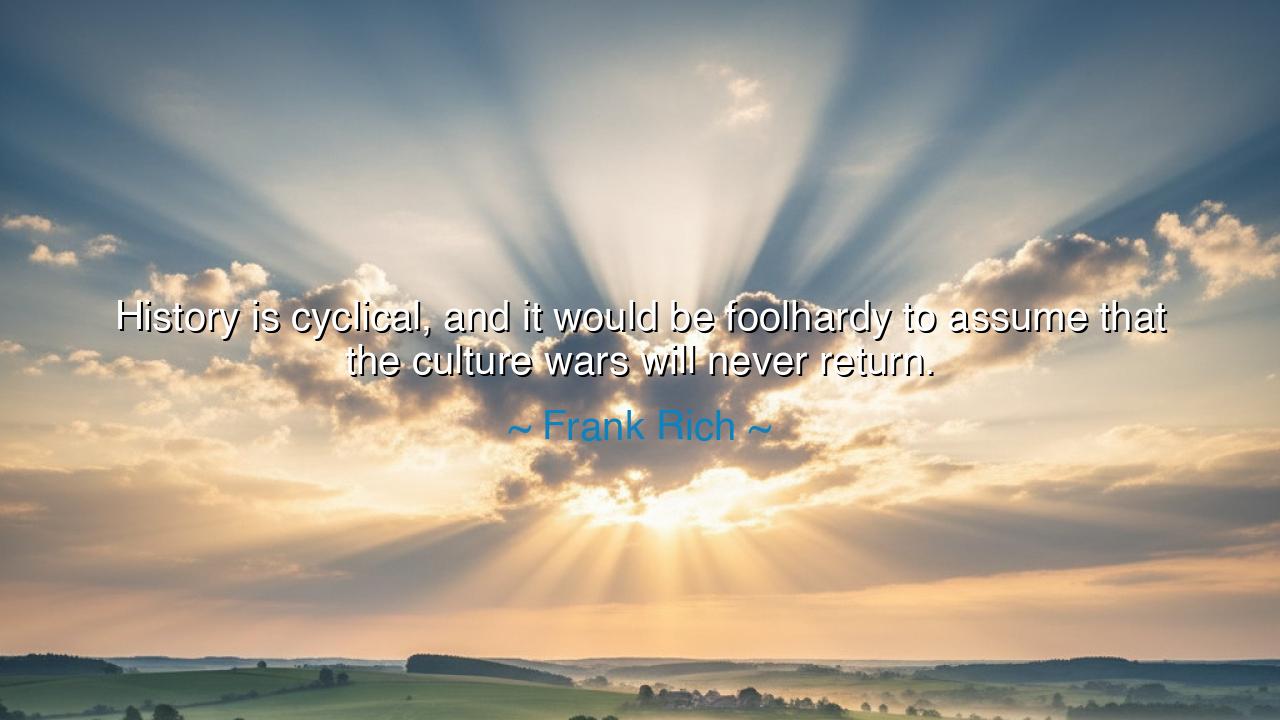
History is cyclical, and it would be foolhardy to assume that the
History is cyclical, and it would be foolhardy to assume that the culture wars will never return.






“History is cyclical, and it would be foolhardy to assume that the culture wars will never return.” – Frank Rich
Hear, O seekers of wisdom, and let these words settle upon your hearts like the slow turning of the seasons. The writer Frank Rich, a chronicler of politics and culture, spoke not from despair but from remembrance when he said, “History is cyclical, and it would be foolhardy to assume that the culture wars will never return.” He reminds us of a truth older than empires: that the story of humanity moves not in a straight line, but in a circle. History is cyclical—it rises and falls, repeats and renews, as each generation forgets the lessons of the last. The tides of conflict between belief and progress, between old and new, retreat for a time only to surge again with greater force.
In every age, humanity has waged its culture wars—not always with swords, but with words, with symbols, with laws. The ancients fought over the gods and the shape of virtue. The medieval world battled over faith and knowledge. The modern age struggles over identity, truth, and the power of story itself. Rich’s words are a warning wrapped in wisdom: do not think your time immune to the storms that once swept the ages. For what is forgotten is fated to return. The battles of thought and spirit are eternal, reborn whenever a society grows comfortable and begins to mistake peace for permanence.
Look to the example of Ancient Athens, that shining cradle of democracy and art. There was a time when philosophy flourished, when men like Socrates taught that wisdom began in questioning. Yet even in that golden age, fear of change stirred beneath the marble. When Socrates dared to challenge the complacency of the powerful, he was condemned to death—not for treason of the sword, but for treason of the mind. Athens, the city of reason, turned upon its own teacher. And thus, as Rich foretells, the cycle returned: enlightenment gave way to fear, freedom to censorship, and the war between tradition and transformation raged anew.
So it has ever been. The culture wars are not mere political squabbles; they are the reflection of the soul’s eternal struggle—between the comfort of the known and the terror of the new. When one generation builds walls to preserve its certainties, the next generation comes like a flood to tear them down. The pendulum of history swings endlessly between order and rebellion, faith and reason, conformity and freedom. To assume this struggle will cease is to believe the sea will forget to tide, or the sun will forget to rise.
But do not despair at this truth. For within the cycle of history lies both danger and renewal. When the culture wars return, they do so not only to destroy, but to cleanse—to force humanity once more to confront what it believes, what it values, what it fears. The storm tears away the illusions of comfort, revealing what still stands firm. Just as the forest needs fire to renew its soil, so too does civilization need friction to rediscover its purpose. The wise do not curse the storm—they prepare for it, learn from it, and plant seeds that will grow once it has passed.
Consider the time of the Civil Rights Movement in America. Before that age, many believed the battles for equality had been settled with emancipation. Yet the cycle turned again. Old prejudices, buried but not broken, rose from the depths. The marchers of Selma and the dreamers of Washington faced hatred and resistance once more. But through struggle came renewal; through the return of the culture war, justice advanced another step. Thus we see that these conflicts are not the end of civilization—they are its test and its teacher.
So what lesson, then, shall we draw? It is this: Be watchful, and be humble. Do not assume that peace will last forever, nor that progress cannot be undone. Guard truth as a flame that must be tended, not worshiped as a monument that cannot fall. When the cycles of history bring division again—and they will—meet them not with fear, but with understanding. Remember that every battle between beliefs is an opportunity to rediscover what is worth fighting for, and to rebuild what has been lost.
Therefore, my children of the turning world, live with awareness. Study the past, for it is the mirror of tomorrow. Seek not to escape the cycles of history, but to rise above them in wisdom. For the wise know this: though the culture wars may return a thousand times, each return offers the chance to shape them with greater compassion, greater courage, and greater truth. And if we meet them thus, the circle of history may not break—but it may, at last, begin to ascend.






AAdministratorAdministrator
Welcome, honored guests. Please leave a comment, we will respond soon